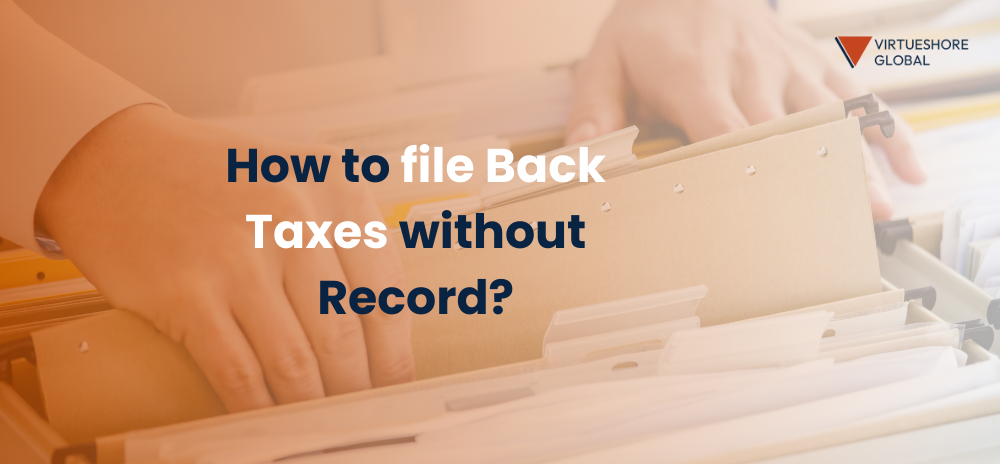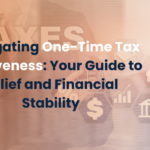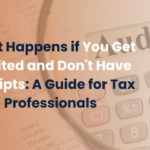Filing taxes as a small business owner is important, but it can get complicated if you’re not ready. Sometimes, you may need to catch up on your taxes. Even if you missed the tax deadline, you can still file back taxes. The real challenge is how to do it when you don’t have your financial records. It’s tough to prepare your tax return without knowing your income. However, there are options available.
Keep reading to find out how to file back taxes without records and why it’s crucial to do so.
What to Do If You Lack Tax Records
Dealing with past-due taxes, often caused by unexpected issues like health problems or personal crises, can be daunting. Neglecting back taxes is sometimes due to the fear of high debts. Despite these challenges, filing all due tax returns promptly is important, even if you cannot pay immediately. This helps avoid additional penalties and ensures more accurate tax assessments.
If you’re missing crucial records needed for filing, this can complicate the process. Understanding how to file back taxes under these circumstances is essential to minimize potential issues.
Gather Available Documents
Gather any available business-related documents that can shed light on your income. These may include:
- Tax returns
- Bank statements
- Pay stubs and payroll records
- Invoices and receipts
- Business records
- Contracts and agreements
- Correspondence with the IRS
- Digital records
- Previous accountants or tax professionals
- Business partners and employees
Remember, the goal is to gather as much information as possible, even if you still need to get all the necessary records. These available documents will serve as valuable pieces of the puzzle as you work to reconstruct your financial history for tax filing purposes.
Estimate Your Income
Estimating your income when filing back taxes without records can be challenging, but it’s a crucial step in the process. While precision may be elusive, you can still come up with reasonable estimates to avoid potential issues with the IRS.
Here’s how to estimate your income for the years you need to file back taxes, tailored specifically for businesses.
Categorize Your Income Sources
Once you’ve gathered your available documents, categorize your income sources. Common categories for business income include:
- Sales revenue: Calculate your sales revenue based on your sales records, invoices, and bank statements. Be sure to differentiate between cash and credit sales.
- Service fees: If your business provides services, estimate the fees charged for those services. Refer to service agreements, invoices, and payment records.
- Product sales: If your business sells products, determine the income generated from product sales. Review invoices, sales records, and inventory logs.
- Investment income: If your business has investments, such as stocks or bonds, consider any income generated from these investments.
- Rental income: Include the rental income in your estimate if you rent out property or equipment. Lease agreements and rent receipts can be helpful.
- Other income sources: Identify any other sources of income specific to your business, such as royalties, commissions, or licensing fees.
Request a Tax Transcript from the IRS if Records Are Unavailable from Payers
Obtaining transcripts from the IRS is a crucial step in the process of filing back taxes without records. The IRS maintains several types of transcripts that can provide valuable information about your past tax filings:
- Tax return transcripts: These transcripts summarize your previously filed tax returns, including information from forms like 1040, 1099, and W-2. They don’t include information from other forms and schedules you may have filed.
- Wage and income transcripts: These transcripts contain data about your income as reported to the IRS by employers, banks, and other entities. They include information on W-2s, 1099s, and other income-related documents.
- Account transcripts: Account transcripts offer a comprehensive overview of your IRS account, including any adjustments, payments, penalties, or interest added to your tax liability.
Now, let’s explore how to request these transcripts and use them in your back tax filing process:
Requesting Transcripts:
You can request transcripts from the IRS in three main ways:
- Online request: The IRS provides an online “Get Transcript” tool on their website. This tool allows you to request and receive transcripts electronically. You’ll need to verify your identity to use this service.
- By phone: You can request transcripts by calling the IRS on their transcript request line. Be prepared to provide your Social Security Number, date of birth, and other identifying information.
- By mail: If you prefer a more traditional approach, you can complete Form 4506-T, Request for Transcript of Tax Return, and mail it to the address specified in the form’s instructions.
Using Transcripts for Reconstruction:
Once you have obtained your transcripts, they can serve as a valuable resource for reconstructing your financial records:
- Income verification: Wage and income transcripts provide a detailed record of income reported to the IRS. Review these transcripts to ensure you capture all sources of income for the relevant tax years.
- Deductions and credits: Tax return transcripts can help identify deductions and credits you claimed in past returns. Use this information as a reference when preparing your back tax returns.
- Account balances: Account transcripts offer insights into any outstanding balances, penalties, or interest accrued. Knowing your account status can help you accurately calculate what you owe.
It’s important to note that while transcripts provide valuable information, they may not cover every detail of your financial history. They are a helpful starting point, but you may still need to estimate certain figures, such as business expenses or deductible items, based on your best recollection and available documentation.
Why You Should File Your Back Taxes
Filing your back taxes is crucial, even if you lack complete records. Addressing this issue helps you stay compliant with tax laws and prevents the accumulation of additional penalties and interest.
Here’s a focused guide on why and how to file back taxes:
Why You Should File Back Taxes:
- Legal Compliance: Filing back taxes ensures adherence to tax laws, reducing the risk of legal consequences.
- Reducing Penalties and Interest: Prompt filing limits the growth of penalties and interest on unpaid taxes.
- Financial Clarity: Resolving back tax issues provides a clearer financial picture and can ease future financial planning.
- Peace of Mind: Addressing and resolving back tax issues can relieve the stress and uncertainty of unresolved tax obligations.
How to File Back Taxes:
- Identify Necessary Forms: Typically, this includes IRS Form 1040 for individual returns, with other forms as needed.
- Obtain Forms: Accessible via the IRS website, local offices, or by mail.
- Complete Forms Accurately: Estimate income and expenses for each tax year to the best of your ability.
- Include a Cover Letter: Explain the lack of records and your approach to estimating financial information.
- Attach Any Supporting Documents: Such as IRS transcripts, previous tax returns, or any financial records you have.
- Calculate Your Tax Liability: Determine what you owe, including income tax, self-employment tax, and other relevant taxes.
- Determine Total Amount Owed: Include penalties and interest in your total debt calculation.
- Submit Your Return: Mail everything to the IRS using certified mail for tracking.
- Make Payment Arrangements: Pay as much as possible and explore payment plans for the balance.
- Keep Copies of All Documents: Maintain records of your filings and correspondence with the IRS.
Benefits of Filing Your Past Due Return
Filing your past due return promptly offers several advantages:
- Avoid interest and penalties: By filing and paying now, you can limit the accumulation of interest charges and late payment penalties.
- Claim a refund: Filing ensures that you can claim any refunds owed to you. Failure to file may result in losing refunds, including withholding or estimated tax refunds, within three years of the due date.
- Protect social security benefits: Self-employed individuals must file their federal income tax return to report their income to the Social Security Administration. Failing to do so means missing out on credits toward Social Security retirement or disability benefits.
- Avoid loan delays: To facilitate loan approvals for purposes like home purchases, business loans, or federal aid applications for education, financial institutions and lenders often require copies of filed tax returns.
Options If You Can’t Pay in Full
If you find yourself unable to pay your tax bill in full, you have several options:
- Request more time: You can ask for an additional 60-120 days to pay your account in full, and no user fee will be charged for this extension.
- Consider an installment agreement: Explore the possibility of setting up an installment agreement to pay your tax debt over time.
- Explore an offer in compromise: Sometimes, you may qualify for an offer in compromise, which allows you to settle your tax debt for less than the full amount owed.
Consequences of Not Filing
Not filing your taxes can lead to various consequences:
- Substitute return: If you fail to file, the IRS may prepare a substitute return on your behalf. However, this return may not consider the deductions and exemptions you’re entitled to.
- Notice of deficiency: You will receive a Notice of Deficiency (CP3219N or 90-day letter) proposing a tax assessment. You’ll have 90 days to file your past-due tax return or file a petition in Tax Court. Failing to do either will result in the IRS proceeding with the proposed assessment.
- Correcting income errors: If the income listed on the substitute return is incorrect, you can take the following steps:
- Contact the IRS at 866-681-4271 to report the error.
- Reach out to the payer (source) of the income to request a corrected Form W-2 or 1099.
- Attach the corrected forms when you submit your completed tax returns.
- Filing your own tax return remains in your best interest, as the IRS will adjust your account to reflect the correct figures. Failure to file can lead to collection and enforcement actions, including wage or bank account levies and federal tax liens. Repeated failures to file may result in additional penalties and even criminal prosecution.
Here’s Our Take!
Even if you don’t have records, you can resolve your IRS tax issues and ensure your business is in good standing. While preparing back tax returns can be challenging, it’s possible by using any available financial information and seeking help from accounting experts. This approach can put your business on the path to long-term tax compliance. Once your federal and state tax filings are complete, you can address your tax debt and put your old tax problems behind you for good.
If you’re unsure about how to proceed with back taxes or need guidance, working with a professional bookkeeper or forensic accounting specialist like VirtueShore can be the right decision to get your business back on track.
FAQs
Can I file back taxes without any financial records?
Yes, you can file back taxes without records by estimating your income and expenses for the relevant tax years. The IRS accepts reasonable estimates when you need complete records.
What form should I use to file back taxes?
You should use IRS Form 1040 or the appropriate tax form for the tax year you are addressing. Make sure to include all relevant financial information.
Is it important to include a cover letter when filing back taxes without records?
Yes, including a cover letter explaining your situation and the steps you’ve taken to reconstruct your financial records is essential. It helps provide context to the IRS.
Are there penalties for failing to file back taxes?
Yes, failing to file back taxes can lead to penalties and interest charges. It’s important to address this issue promptly to avoid additional financial burdens.
Should I seek professional help when filing back taxes without records?
If you need more clarification about any aspect of the process or assistance estimating your income and expenses, it’s advisable to seek help from a tax professional or expert. They can guide you through the process and ensure accuracy.








